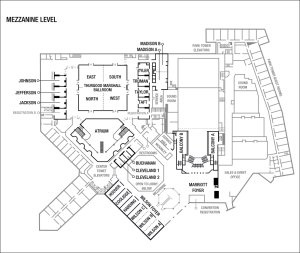Date/time: Thursday, November 17, 9am-12pm, followed by lunch
Location: Marriott Wardman Park Hotel, Washington D.C.

|
Thurgood Marshall West | Thurgood Marshall South | Taylor | Taft | Truman | Tyler |
| 9:00-9:40 | Welcome Session | |||||
| 09:50-10:50 | Digital Public Scholarship
|
Topic Modeling
|
Intro to DH I |
Programming for Humanists I — Intro | GIS | Databases and Visualizations |
| 11:00-11:50 | Blogging
|
Eastern European Languages – Character Recognition, Encoding, and other Issues | Intro to DH II | Programming for Humanists II — Advanced | Text Analysis and TEI | Digital Archives |
| 11:50-12:00 | Wrap-up | Lunch groups |
Session Descriptions
Intro to DH I & II (Jessie Labov, Philip Gleissner)
These consecutive sessions will offer a beginning-level introduction to DH, surveying some of the most important debates and common practices. It is designed for people who have had little to no experience in DH, or for those who have only worked in one area and want to find out some basic information about the others. The first hour will offer a brief history of DH from “humanities computing” of the late 20c to the present, a survey of recent debates in DH, and case studies of text analysis, mapping, and interactive collections/exhibits. The second hour will focus more on network analysis and topic modeling, as well as the politics of DH, but can also revisit earlier topics if necessary.
Digital Public Scholarship (Joan Neuberger)
Blogging (Josh Sanborn)
Participants in this session will discuss academic blogging as a form of scholarly communication. How is blogging different from other forms of publication? What do blogs do particularly well (or poorly!)? What should you consider when beginning the blogging process?
Programming for Humanists I/Introduction (David Birnbaum, Seth Bernstein)
This session will describe and present examples of some uses of programming languages, tools, and environments in digital humanities. No programming knowledge or experience required.
Programming for Humanists II/Advanced (Seth Bernstein)
In this session, participants will discuss and troubleshoot projects they have undertaken and problems they have run into while programming for humanities research. Participants should have some programming experience.
GIS (Kelly O’Neill)
Geographic information systems are powerful tools for organizing, producing, analyzing, and visualizing knowledge. Come dig into some spatial data, experiment with an assortment of mapping platforms, and think through some of the juicy questions that arise when qualitative and quantitative methods vie for the attention of the humanist scholar.
Databases and Visualizations (Andrew Janco)
This is a session about data: data cleaning, database design, data modeling, ontologies as well as ways to analyze, visualize and make sense of data. What is a database? When should a spreadsheet become a database? What is good database design?
Digital Archives (Andrew Janco)
Digital curation is a key part of most Digital Humanities projects. In this session, we’ll discuss topics related to digital exhibits, digital archives, content management, metadata, digital forensics and digital preservation.
Digital Pedagogy (Marijeta Bozovic)
This session will consider some of the fundamental innovations and challenges that arise in teaching DH, as well as new facets of mentoring, advising, and training that are required for researchers at all levels. How do we reconcile the inherently collaborative nature of DH with the hierarchy of our classrooms and curricula? How do we account for the unseen labor of graduate students and research assistants that often goes into DH projects, and properly acknowledge the contributions of all involved? These questions and more will be open for discussion as we compare experiences working in DH as teachers and students.
Course development (Jessie Labov)
This session will approach the issue of DH course development on several levels: 1) what are the best curricular strategies for including DH in our disciplinary profiles? 2) When should we emphasize intro-level literacy across different DH fields, and when should we focus on developing deep skills in a given area? 3) The 12-15 week semester presents an interesting problem for planning DH courses: how do we move from an introductory level to carrying out DH projects in less than 3-months? What assignment structures work best for what kinds of DH courses? Answers will differ across disciplines and institutions, of course; in this session we are simply seeking common experiences that can be useful for all.
Topic modeling (Carlotta Chenoweth)
The aim of this workshop is to introduce scholars to topic modeling. We will practice implementing topic modeling on a sample text and then will discuss the potential applications and ramifications of this frequently employed method.
Working with Eastern European Languages – Character Recognition, Encoding, and other Issues (David Birnbaum)
This session will explain how Slavic texts and other textual materials are represented in the computer, and introduce the use of optical character recognition (OCR) for transferring printed information to machine-readable files.
Network Analysis (Tom Ewing, Philip Gleissner)
This session provides introduces key concepts of social network analysis, its potential affordances for humanities research and a hands-on exploration of the network analysis software Cytoscape. Depending on the interests of the participants, it can also include an advanced discussion of problems in the application of network analysis.
Text Analysis, and TEI (Susana Aho)
An introduction to text analysis featuring discussion of Juxta Commons and Voyant Tools, as well as a brief overview of TEI. Bring your own examples and challenges dealing with any form of text analysis, and we will launch our conversation from there!



